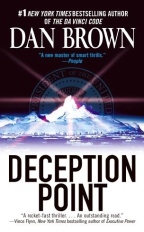Deception Point
Dan Brown
Pocket Books/Simon & Schuster, Inc.
US Paperback
ISBN: 0-671-02738-7
558 Pages; $7.99
Publication Date: December, 2002
Date Reviewed: June 8, 2004
Reviewed by: Terry D'Auray © 2004

REFERENCES
COLUMNS
|
|
|
Deception PointDan BrownPocket Books/Simon & Schuster, Inc.US PaperbackISBN: 0-671-02738-7558 Pages; $7.99Publication Date: December, 2002Date Reviewed: June 8, 2004Reviewed by: Terry D'Auray © 2004 |
|
|
REFERENCES |
COLUMNS |
'Deception Point' is Dan Brown's third book, first published in hardcover in 2001 and now reprinted in a shiny new paperback to ride on the coattails of his super-seller 'The DaVinci Code'.
To read a techno-science thriller like 'Deception Point', you must be prepared to swallow some throat-clogging stuff at the outset. First, you have to buy the premise - in this case, that governmental agencies will knowingly commit all manner of fraud, felonies, and deceit and cause countless deaths in order to save...NASA. [ *1 ] Second, you must swallow that the book's characters truly believe their science and technology is supreme, it's light-years beyond anything anyone has conceived of ever before, it's infallible and that it will not fail - ever. And finally, you must buy that these characters sincerely believe that "top secret" means just that. Top secret means nobody outside the chosen few, not a single soul living or dead, knows what's up. Now, if you can swallow all this, then you're going to have a good time with this book. If not, spare yourself.
The first part of Brown's lengthy novel builds the hard-to-swallow scaffolding and introduces the cast of characters. It sets up the premise - that NASA has discovered irrefutable evidence of the existence of extraterrestrial life a meteor buried deep under the icy crust of Ellesmere Island. [ *2 ] In the second half of the book, both the premise and the characters collapse and the reader gets to watch all hell break loose. It's actually kind of fun.
Brown's characters are apropos for his novel, mostly slack-jawed scientists (initially slack-jawed at the magnificence of their discovery, and later slack-jawed at its disintegration), shrewd, scheming politicians, and a couple of truly honest, righteous souls you can really trust. One of the trustworthy ones is Rachael Sexton, a "gister" for the top-secret NRO, the source of cutting-edge spy technology. What's a gister, you ask? Well, it's a job to which we can all aspire. Rachael basically reads about all this top-secret, high-tech, spacey spy stuff and synthesizes it into a single-page executive summary - capturing the gist of it - and delivers it to no less a vaulted office than the Oval one. Her boss, Pickering, a/k/a "The Quaker" is also trustworthy. So is the handsome Carl-Sagan-meets-Jacques-Cousteaux marine scientist and T.V. star with whom Rachael shares her adventures. The problem with being a trustworthy character in a book of this sort is that at least one of you has to be killed off in the service of realism and tragedy.
There are a number of scurrilous schemers here too - the truly noxious, ugly as all get out, super scheming chief assistant to the President of the United State; the licentious US Senator and front-running Presidential challenger (who just happens to be Rachael's father - for a layer of complexity) and his drop-dead gorgeous, super-scheming chief assistant; and, of course, the Director of NASA about which this whole story swirls. The problem with being a villainous character in a book of this sort is that at least one of you has to survive in service of realism and tragedy. Brown tosses in some uber-military killers referred to only as Delta-plus-a-number (who have complete immunity under the law) to do the dirty work of killing, bombing and such. Brown cleverly waits to unveil the identity of the true Delta commander (I mean the guy they really, truly, take orders from) until the book's end.
Plotting drives 'Deception Point' and once you've swallowed the initial premises[ *3 ], everything pretty much makes sense thereafter. The scientific stuff is extensive, well researched and within hailing distance of credible. At over 550 pages, it's a very big book, yet it's barely big enough to hold all its multiple plot lines.
Pacing is what makes the book really work and Brown's pacing is certifiably breathtaking. The story jumps in short spurts from character to character, locale to locale, incident to incident, each left dangling at just the right place. Good guys hurling across an ice field to a certain death - cut to the Senator's illicit meeting with the big-money brokers supporting his campaign - cut to the White House press conference on NASA where the President will announce - cut. You read on to find out what happens next only to find that while doing so, more dangling threads have been woven, more twists inserted. By the time you've resolved them all, well, you've read practically the whole damn book. Might as well finish off the last few pages wherein order and sanity are restored[ *4 ] and the right guy kisses the right girl.
Brown's prose, while not particularly elegant, is fully adequate for his job. He can mix techo-talk with historical trivia, make arcane scientific premises (mostly real ones, I hear, though you couldn't prove it by me) comprehensible, and write some pretty realistic dialogue.
So what's a reader to make of all this? If you read Michael Crichton's 'Jurassic Park' and found it unenlightening, inelegant, and clumsy but nonetheless moderately entertaining and enjoyable, then you will probably enjoy 'Deception Point.[ *5 ]